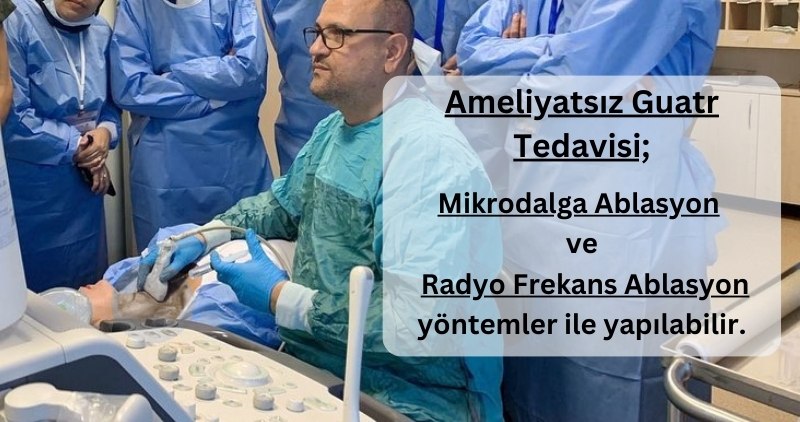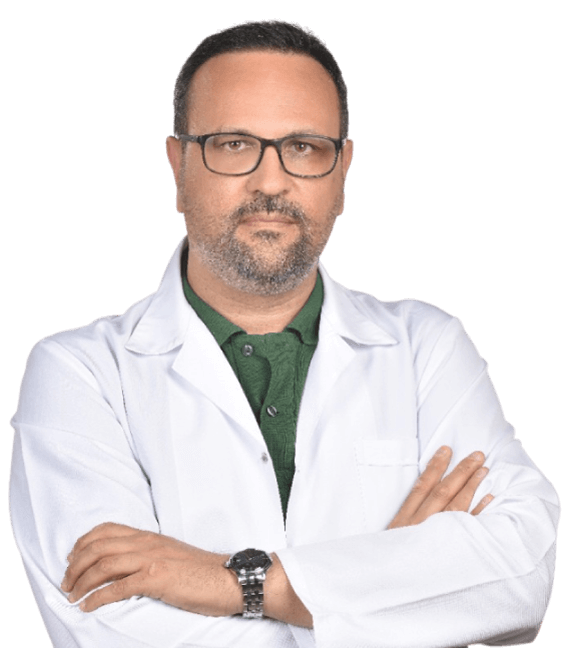Non-surgical goiter treatment has gained great interest in recent years and offers effective solutions for many patients without the need for surgical intervention. Interventional radiology specialists perform these treatments, offering many advantages. In this article, we will thoroughly discuss how non-surgical treatment options for goiter are applied, in which cases they are preferred, and what to expect during the treatment process. For patients who are hesitant about surgery or are not suitable for surgery, these methods stand out with quick recovery and low-risk benefits.

What is goiter?
Goiter occurs when the butterfly-shaped thyroid gland in the front of the neck grows abnormally. This growth can sometimes affect the entire gland or form small lumps called nodules. While some people may not notice goiter, in others, it may manifest as a noticeable swelling in the neck. As the swelling grows, difficulty swallowing or breathing problems may occur.
Is non-surgical goiter treatment possible?
Yes, although the word goiter often immediately brings surgery to mind, surgery is not required for every case, and goiter can be treated without surgery.
Especially in recent years, various methods have been developed for treating goiter non-surgically. Surgery is only required in cases with very large thyroid nodules, thyroid cancer risk, or significant obstruction, where non-surgical methods are not applicable.
What are the non-surgical goiter treatment methods?
The most commonly used non-surgical goiter treatments are thyroid ablation therapies. Among these, Microwave Ablation and Radiofrequency Ablation methods provide effective results in most cases. For non-surgical goiter treatment, you can seek help from Assoc. Prof. Dr. Bülent Çekiç, who provides services at his Interventional Radiology Clinic in Antalya Muratpaşa, with patients from cities like Istanbul and Ankara.
In cases of early diagnosis, hormone levels can be balanced with medication, and goiter growth can be controlled. In Turkey, where iodine deficiency is a widespread problem, many patients recover without surgery through iodine supplementation and regular check-ups.
Who is eligible for non-surgical goiter treatment?
Non-surgical goiter treatment is generally preferred for individuals with benign nodules or those whose nodules do not show significant growth. It is especially suitable for cases where thyroid hormone levels are normal or where goiter can be controlled with medication. Symptoms such as difficulty swallowing, shortness of breath, neck swelling, and pressure can be present in these cases. Non-surgical treatment is more appropriate in situations where nodules monitored with ultrasound carry minimal risk. In such cases, treatments like thyroid needle biopsy or radioactive iodine therapy may be used to address the issue.
The decision for non-surgical treatment depends on the patient's health status or personal preferences. Below, we provide information on the conditions under which non-surgical treatment can be applied.
Benign nodules without cancer risk
If thyroid nodules are benign and not growing rapidly, non-surgical options like microwave ablation, radiofrequency ablation, or radioactive iodine therapy can yield successful results.
Mild or moderate symptoms
If symptoms such as mild swelling or discomfort do not require surgery, hormone therapy or iodine supplementation may be sufficient to alleviate the condition.
Patients at high surgical risk
Patients with other health conditions like heart disease or high blood pressure may not be suitable for surgery. In these cases, non-surgical treatment options offer a safer alternative.
Patient preference
Some patients may avoid surgery due to concerns about complications, anesthesia, or surgical scars. Non-surgical thyroid nodule treatment offers lower risks and minimal invasiveness.
Recurring thyroid issues
For patients whose thyroid problems recur after surgery, methods like laser ablation are recommended as an alternative to a second surgery.
Need for quick recovery
For patients who want to quickly return to their daily activities, non-surgical treatment is an ideal option since it offers a faster recovery time compared to surgery.
Which doctor should I consult for non-surgical goiter treatment?
If you are looking for non-surgical goiter treatment, the first doctor you should consult is an endocrinologist.
Endocrinologists specialize in organs related to the hormone system, such as the thyroid gland, and treat conditions like goiter and hypothyroidism. In addition to endocrinologists, interventional radiology specialists are also involved in non-surgical goiter treatments.

 TR
TR

